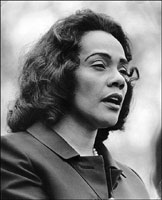EDITORIAL
There was more to Coretta Scott King
Published Jan 31, 2006 11:33 PM
One of the most recognizable photos of Coretta Scott King was captured during
the April 9, 1968, funeral of her spouse, the Rev. Dr. Martin Luther King Jr.,
who was assassinated on April 4 of that year. The photo showed a very somber Ms.
King giving loving comfort to her very young daughter, Bernice.
Now the
world is paying tribute to Coretta Scott King, who passed away on Jan. 31 at the
age of 78. Her health had deteriorated after suffering a stroke and heart attack
last year.
While her world-renowned spouse was alive, Ms. King was seen
mostly in his shadow—thanks mainly to the sexist-oriented mainstream
media. But so many times she was in the forefront of marches for civil rights,
especially in Alabama, and helped raise funds for the struggle at “Freedom
Concerts.”
Following Dr. King’s death, Ms. King continued to
champion various causes for more than civil rights, while at the same time
raising four children as a single parent. Born into rural poverty in Alabama,
she supported the demands of striking sanitation workers in Memphis as did Dr.
King; spoke at rallies against the Vietnam War, such as the one held in Central
Park on April 27, 1968, and marched against apartheid South Africa during the
1980s. She was also a vocal critic of the Iraq War until illness overcame
her.
Ms. King was instrumental in leading a massive campaign to win an
official federal holiday recognizing the Jan. 15 birthday of Dr. King, which is
now commemorated on the third Monday of every January. This holiday was first
implemented during the reactionary Reaganite era on Jan. 20, 1986.
Coretta Scott King should be remembered not just as the partner of the
most beloved civil rights leader of the 20th century but as someone who was her
own person, with her own convictions, that led her to make important
contributions to the struggle for social justice and equality.
Articles copyright 1995-2012 Workers World.
Verbatim copying and distribution of this entire article is permitted in any medium without royalty provided this notice is preserved.
Workers World, 55 W. 17 St., NY, NY 10011
Email:
[email protected]
Subscribe
[email protected]
Support independent news
DONATE


